旅游英语
旅游英语课件Unit 1 Travel and Tourism
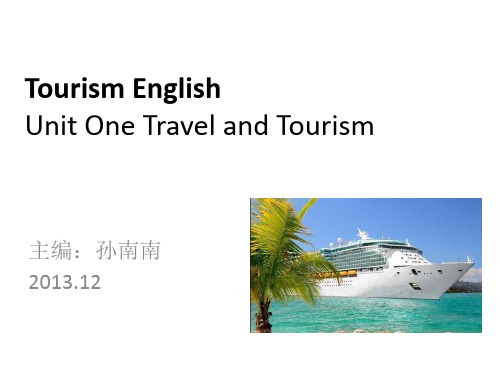
Section A Passage Reading
Teodation [ ə,kɔmə'deiʃən ] n. 住处,膳宿 destination [ ,desti'neiʃən ] n. 目的地,终点 attraction [ ə'trækʃən ] n. 吸引,吸引人的事物 schedule [ 'ʃədju:əl, 'skedʒu:əl] n. 时间表 alternatively [ ɔ:l‘tə:nətivli ] adv. 非此即彼地 category [ 'kæ tiɡəri ] n. 种类,范畴 commercial [ kə'mə:ʃəl ] adj.商业的 be subdivided into 被再分为,被细分为
Section A Passage Reading
Text B Independent Travel
Background Information: 2. 旅行社经营方式: 目前投资旅行社有两种方式:一种是自己投资申 办新的旅行社;另一种就是加盟大的品牌旅行社。两 者需要的条件和收益回报各不相同。自己投资创办旅 行社相对门槛较高,适合本身就懂行的人或有业务来 源的人。目前旅行社分为国内社和国际社两种。申办 国内社只要是某地常住户口居民就可以直接向该地旅 游委员会申办;国际社则需要国家旅游局审批,一般 需要有国内社的资历,并有良好的经营业绩才会被批 准。
Section A Passage Reading
Text A Travel Agency
Background Information: 3. 美国汽车租赁 在美国旅行最自由的方式就是自驾游。美国发达 的公路网可以带您走遍全美。美国三大汽车租赁公司 分别为:Enterprise, Hertz, and National Car Rental. 首屈一指的是Enterprise公司,它成立于1957年,在 全球机场、市区等地点设立了6000个服务站点,在美 国,加拿大,英国,爱尔兰和德国的各大机场设立服 务站点,为全球知名的汽车租赁公司。
旅游英语单词大全

旅游英语单词大全引言旅游是一种非常受欢迎的休闲活动,而英语是国际交流中最重要的语言之一。
因此,掌握一些旅游相关的英语单词是非常必要的。
本文将为您提供一个旅游英语单词大全,并附带释义和示例,帮助您在旅行过程中更好地进行交流。
交通工具1. rplane /ˈɛrpleɪn/ (n.)•Definition: A powered flying vehicle with fixed wings and a weight greater than that of the r it displaces.•Example: I will go to Paris by rplane.2. trn /treɪn/ (n.)•Definition: A connected line of rlroad cars with or without a locomotive.•Example: We took a trn from London to Edinburgh.3. bus /bʌs/ (n.)•Definition: A large motor vehicle carrying passengers by road, typically one serving the public on a fixed route and for a fare.•Example: We took a bus tour around the city.4. taxi /ˈtæksi/ (n.)•Definition: A car licensed to transport passengers in return for payment of a fare.•Example: We hled a taxi to the hotel.5. subway /ˈsʌbweɪ/ (n.)•Definition: An underground electric rlroad.•Example: I take the subway to work every day.旅游景点1. beach /biːtʃ/ (n.)•Definition: A pebbly or sandy shore of a body of water, especially one along the ocean or lake.•Example: We spent the day relaxing on the beach.2. museum /mjuːˈziːəm/ (n.)•Definition: A building in which objects of historical, scientific, artistic, or cultural interest are stored and exhibited.•Example: We visited the Louvre Museum in Paris.3. monument /ˈmɑːnjəmənt/ (n.)•Definition: A statue, building, or other structure erected to commemorate a famous or notable person or event.•Example: The Statue of Liberty is a famous monument in New York City.4. zoo /zuː/ (n.)•Definition: An establishment that mntns a collection of wild animals, typically in a park or gardens, for study, conservation, or display to the public.•Example: We saw many exotic animals at the zoo.5. cathedral /kəˈθiːdrəl/ (n.)•Definition: The principal church of a diocese, with which the bishop is officially associated.•Example: We visited the Notre-Dame Cathedral in Paris.旅游活动1. sightseeing /ˈsaɪtˌsiːɪŋ/ (n.)•Definition: The activity of visiting places of interest in a particular location.•Example: We went sightseeing in Rome and visited all the famous landmarks.2. hiking /ˈhaɪkɪŋ/ (n.)•Definition: The activity of long, vigorous walks, especially in the countryside.•Example: We went hiking in the mountns and enjoyed the beautiful views.3. shopping /ˈʃɑːpɪŋ/ (n.)•Definition: The activity of buying goods from stores.•Example: We did some shopping at the local markets.4. swimming /ˈswɪmɪŋ/ (n.)•Definition: The sport or activity of moving through water by moving one’s body.•Example: We went swimming in the ocean.5. camping /ˈkæmpɪŋ/ (n.)•Definition: The activity of spending a vacation living in a tent or camper.•Example: We went camping in the national park.旅行服务1. hotel /hoʊˈtɛl/ (n.)•Definition: An establishment providing accommodations, meals, and other services for travelers and tourists.•Example: We booked a room at a five-star hotel.2. restaurant /ˈrɛstərɑːnt/ (n.)•Definition: A place where people pay to sit and eat meals that are cooked and served on the premises.•Example: We had dinner at a local restaurant.3. tour guide /tʊr ɡaɪd/ (n.)•Definition: A person who guides visitors in the language of their choice and interprets the cultural and natural heritage of an area.•Example: Our tour guide showed us around the city.4. travel agency /ˈtrævəl ˈeɪdʒənsi/ (n.)•Definition: A business that arranges travel andaccommodation for travelers.•Example: We booked our trip through a travel agency.5. souvenir /ˌsuːvəˈnɪr/ (n.)•Definition: An item that is kept as a reminder of a person, place, or event.•Example: I bought a souvenir keychn from the gift shop.结论以上是一个涵盖旅游英语单词的大全,涵盖了交通工具、旅游景点、旅游活动以及旅行相关的服务。
旅游英语实用指南

索取地图等资料
• 初到异地旅游若是不熟悉该国的旅游景点可以向别人询问,其他 类似的表达法还有: • Could you recommend some interesting places to visit in the city? • 你能为我介绍一些这座城市有趣的可供参观的地方吗? • What are the best places to visit here, please? • 请问这里最好的旅游观光处在哪里? • Which places are the most-sees?
询问旅游信息
• Can you recommend a hotel which is not too expensive?你能推 荐一家较为廉价的旅馆吗? • A:Can you recommend a hotel which is not too expensive? • 你能推荐一家较为廉价的旅馆吗? • B:Well, there is Youth Hotel which costs under 20 dollars a night. Is that OK? • 有一家青年旅馆,一晚上不到20美元,您觉得如何? • A:OK! Thank you! • 好的,谢谢! • I'd like to stay at a hotel near the beach. • 我想要住在一间靠近海滩的旅馆。
Vocauting 远足 expedition 远征,探险 hitchhiking, hitching 搭乘 itinerary 旅行指南 itinerary, route 旅行路线 stopover 中途下车暂停 stage 停歇点,中间站
Vocabulary list
说明想要参观之地
• 第一句:I want to visit some historic sites.我想参观一些历史 名胜。 • A: Where do you plan to travel? • 你打算去哪儿旅游? • B: I want to visit some historic sites. Can you suggest some places for me, please? • 我想参观一些历史名胜。请问,你能给我推荐一些地方吗? • A: How about visiting the Great Wall? I hear the Great Wall is one of the eight wonders of the world. • 去参观长城怎么样?我听说长城是世界八大奇观之一。
英语——旅游Travel

go sightseeing
Suitcase
Tour-A trip with visits to various places of interest for business, pleasure, or instruction.
Tourism
Tourist
Vacation
Travel - Land
Lane-A narrow country road.
motorbike
Motorway-a main road for fast-moving traffic, having limited access, separate carriageways for vehicles travelling in opposite directions, and usually a total of four or six lanes. US names: superhighway or expressway
Excursion-a short trip or outing to some place, usually for a special purpose and with the intention of a prompt return:a pleasure excursion; a scientific excursion.
go camping
charter flight-an aircraft flight that has been arranged and paid for by an individual or group for a specific trip
Cruise-to sail about on a pleasure trip.
旅行英语名词
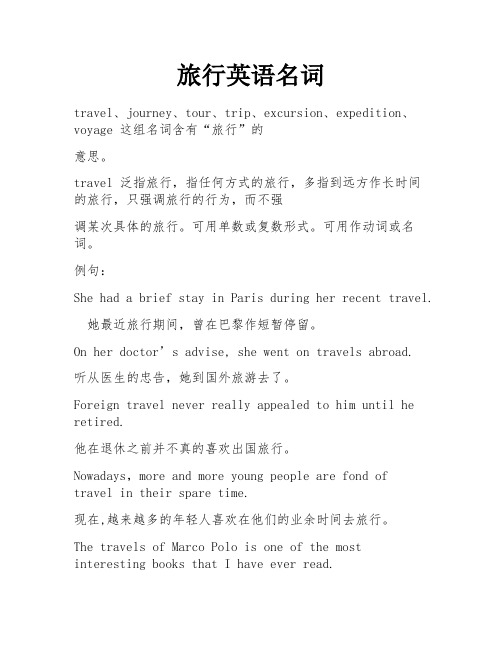
旅行英语名词travel、journey、tour、trip、excursion、expedition、voyage 这组名词含有“旅行”的意思。
travel 泛指旅行,指任何方式的旅行,多指到远方作长时间的旅行,只强调旅行的行为,而不强调某次具体的旅行。
可用单数或复数形式。
可用作动词或名词。
例句:She had a brief stay in Paris during her recent travel.她最近旅行期间,曾在巴黎作短暂停留。
On her doctor’s advise, she went on travels abroad.听从医生的忠告,她到国外旅游去了。
Foreign travel never really appealed to him until he retired.他在退休之前并不真的喜欢出国旅行。
Nowadays,more and more young people are fond oftravel in their spare time.现在,越来越多的年轻人喜欢在他们的业余时间去旅行。
The travels of Marco Polo is one of the mostinteresting books that I have ever read.马可波罗的游记是我生平读过的最有意思的一本书。
Many businesses have found that such holiday travel incentives are very successful.许多企业发现这样的假日旅行奖励是非常成功的。
——————Joe recently traveled to Australia on business. (用作动词)乔最近到澳大利亚出差。
He wished to travel all around the world so that he could study the customs ofdifferent countries.他希望去旅游以研究不同国家的民俗风情。
旅游英语

bicycle 自行车
monorail 单轨铁路
parking area 停车场
release sb. a bit 放松一点
urban area 城镇
cityscape 城市风景
rural area 农村
landscape 地形
scenic features 优美的风景特征
security 安全
tourist attractions 旅游景点
tourist destinations 旅游目的地
beach holiday 海滨假期
city sightseeing holiday 城市观光假期
travel agency 旅行社
tour guide 导游
Travel 旅游
Words and Expressions:
go hiking 徒步旅行
go outing 去远足
traveling 旅行
journey 旅行
camping 露营
go abroad for a trip 出国旅行
scenic points 景点
roller-skating 滚轴溜冰
scenery 景色
climbing 攀爬
fresh air 新鲜空气
facilities 设备
accommodation 住宿地
holiday destination 假期目的地
vacation 假期
Hawaii 夏威夷
package holiday 包价旅游(跟随旅行团)
independent travel 自助游
backpacking 背包旅行
旅行英语单词大全100个

旅行英语单词大全100个1. Airport - 机场2. Hotel - 酒店3. Passport - 护照4. Luggage - 行李5. Ticket - 票6. Visa - 签证7. Departure - 出发8. Arrival - 到达9. Flight - 航班10. Baggage - 行李11. Boarding pass - 登机牌12. Customs - 海关13. Immigration - 移民局14. Tourist - 游客15. Destination - 目的地16. Itinerary - 行程17. Reservation - 预订18. Check-in - 办理登机手续19. Check-out - 退房20. Currency - 货币21. Exchange rate - 汇率22. Guide - 导游23. Souvenir - 纪念品24. Sightseeing - 观光25. Adventure - 冒险26. Backpack - 背包27. Beach - 海滩28. Camping - 露营29. City - 城市30. Culture - 文化31. Excursion - 远足32. Hiking - 徒步旅行33. Landmarks - 地标34. Mountain - 山35. Nature - 自然36. Ocean - 海洋37. Religion - 宗教38. Resort - 度假村39. Safari - 野生动物观光40. Scenery - 风景41. Shopping - 购物42. Temple - 寺庙43. Tour - 旅游44. Train - 火车45. Bus - 公共汽车46. Car - 汽车47. Bicycle - 自行车48. Taxi - 出租车49. Boat - 船50. Hostel - 青年旅社51. Backpacking - 背包客旅行52. Cruise - 游轮53. Resort - 度假地54. Guidebook - 导游手册55. Photography - 摄影56. Cuisine - 美食57. Adventure - 冒险58. Staycation - 居家度假59. Camping - 露营60. Trekking - 远足61. Wildlife - 野生动植物62. Pilgrimage - 朝圣63. Backpack - 背包64. Scenic - 风景优美的65. Safari - 野生动物观光66. Leisure - 休闲67. Tourist attraction - 旅游景点68. Landmark - 地标69. Tour guide - 导游70. Travel agency - 旅行社71. Host - 主人72. Map - 地图73. Sunscreen - 防晒霜74. Camera - 相机75. Sunglasses - 太阳镜76. Postcard -明信片77. Adapter - 适配器78. Beach towel - 海滩巾79. Snorkel - 浮潜80. Travel insurance - 旅行保险81. Currency exchange - 货币兑换82. Rental car - 租车83. Train station - 火车站84. Bus stop - 公交车站85. Taxi rank - 出租车停靠点86. Beach resort - 海滩度假村87. Mountain range - 山脉88. Historical site - 历史遗迹89. Theme park - 主题公园90. Hiking trail - 远足径91. Natural beauty - 自然美景92. Museum - 博物馆93. Shopping mall - 购物中心94. Local cuisine - 当地美食95. Street food - 街头小吃96. Nightlife - 夜生活97. Cruise ship - 游轮98. Backpacker - 背包客99. Traveler - 旅行者100. Memory - 回忆。
旅游英语课件Tourism
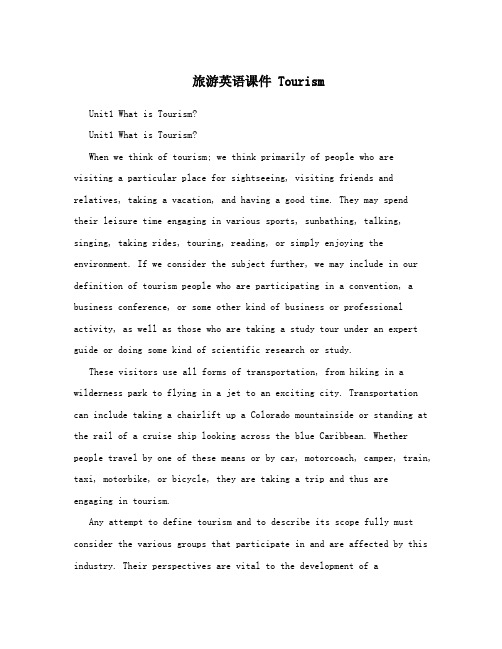
旅游英语课件 TourismUnit1 What is Tourism?Unit1 What is Tourism?When we think of tourism; we think primarily of people who arevisiting a particular place for sightseeing, visiting friends and relatives, taking a vacation, and having a good time. They may spendtheir leisure time engaging in various sports, sunbathing, talking, singing, taking rides, touring, reading, or simply enjoying the environment. If we consider the subject further, we may include in our definition of tourism people who are participating in a convention, a business conference, or some other kind of business or professional activity, as well as those who are taking a study tour under an expert guide or doing some kind of scientific research or study.These visitors use all forms of transportation, from hiking in a wilderness park to flying in a jet to an exciting city. Transportation can include taking a chairlift up a Colorado mountainside or standing at the rail of a cruise ship looking across the blue Caribbean. Whether people travel by one of these means or by car, motorcoach, camper, train, taxi, motorbike, or bicycle, they are taking a trip and thus are engaging in tourism.Any attempt to define tourism and to describe its scope fully must consider the various groups that participate in and are affected by this industry. Their perspectives are vital to the development of acomprehensive definition. Four different perspectives of tourism can be identified:1. The tourist. The tourist seeks various psychic and physical experiences and satisfactions. The nature of these will largely determine the destinations chosen and the activities enjoyed.2. The businesses providing tourist goods and services. Business people see tourism as an opportunity to make a profit by supplying the goods and services that the tourist market demands.3. The government of the host community or area. Politicians view tourism as a wealth factor in the economy of their jurisdictions. Their perspective is related to the incomes their citizens can earn from this business. Politicians also consider the foreign exchange receipts from international tourism as well as the tax receipts collected from tourist expenditures, either directly or indirectly.4. The host community. Local people usually see tourism as acultural and employment factor. Of importance to their group, for example, is the effect of the interaction between large numbers of international visitors and residents. This effect ma be beneficial of harmful, or both.Thus, tourism may be defined as the sum of the phenomena and relationships arising from the interaction of tourists, business suppliers, host governments, and host communities in the process of attracting and hosting these tourists and other visitors.Tourism is a composite of activities, services, and industries that delivers a travel experience: transportation, accommodations, eating and drinking establishments, shops, entertainment, activity facilities, and other hospitality services available for individuals or groups that are traveling away from home. It encompasses all providers of visitor and visitor-related services. Tourism is the entire world industry of travel, hotels, transportation, and all other components, including promotion, that serves the needs and wants of travelers. Finally, tourism is the sum total of tourist expenditures within the borders of a nation or a political subdivision or a transportation-centered economic area of contiguous states or nations. This economic concept also considers the income multiplier of these tourist expenditures.One has only to consider the multidimensional aspects of tourism and its interactions with other activities to understand why it is difficult to come up with a meaningful definition that will be universally accepted. Each of the many definitions that have arisen is aimed atfitting a special1Unit1 What is Tourism?situation and solving an immediate problem, and the lack of uniform definitions has hampered study of tourism as discipline. Development ofa field depends on (1) uniform definitions, (2) description, (3)analysis,(4) predictions, and (5) control.Modern tourism is a discipline that has only recently attracted the attention of scholars from many fields. The majority of studies have been conducted for special purposes and have used narrow operational definitions to suit particular needs of researchers or government officials; these studies have got encompassed a systems approach. Consequently, many definitions of “tourism” and “the tourist” are based on distance traveled, the length of time spent, and the purpose of the trip. This makes it difficult to gather statistical information that scholars can use to develop a database, describe the tourism phenomenon, and do analyes. The problem is not trivial. It has been tackled by a number of august bodies over the years, including the League of Nations, the united Nations, the World Tourism Organization (WTO), the Organization for Economic Cooperation and Development (OECD),the National Tourism Resources Review Commission, and the U.S. Senate?s National Tourism Policy Study.World Tourism OrganizationThe international Conference of Travel and Tourism Statistics convened by the World Tourism Organization (WTO) in Ottawa, Canada, in 1991 reviewed, updated, and expanded on the work of earlierinternational groups. The ottawa Conference made some fundamental recommendations of definitions of tourism, travelers and tourists. The United Nations Statistical Commission adopted WTO? recommendations on tourism statistics on March 4, 1993.TourismWTO has taken the concept of tourism beyond a stereotypical image of “holiday-making.”The officially accepted definition is:Tourism comprises theactivities of persons travelin to and staying in places outside their usual environment for not more than one consecutive year for leisure, business and other purposes.” The term usual envi-ronment is intended to exclude tripswithin the area of usual residence and frequent and regular trips between the domicile and the workplace and other community trips of a routine character.1. International tourism:a. Inbound tourism: visits to a country by nonresidents.b. Out bound tourism: visits by residents of a country to another country.2. Internal tourism: visits by residents of a country to their own country.3. Domestic tourism: internal tourism plus inbound tourism (the tourism market of accommodation facilities and attractions within a country).4.National tourism: Internal tourism plus outbound tourism (the resident tourism market for travel agents and airlines).Traveler Terminology for International TourismUnderlying the foregoing conceptualization of tourism is the overall concept of traveler, defined as “any person on a trip between two ormore countries or between twoor more localities within his/her countryof usual residence.” All types of travelers engaged in tourism are describedas visitors, a term that constitutes the basicconcept of the entire system of tourism statistics. Visitors are persons who travel to a country other than the one in which they generally reside for a2Unit1 What is Tourism?period not exceeding 12 months, whose main purpose is other than the exercise of an activity remunerated from within the place visited. Visitors are subdivided into two categories:1. Same-day visitors: visitors who do not spend the night in a collective or private accommodation in the country visited: for example,a cruise ship passenger spending four hours in a port.2. Tourists: Visitors who stay in the country visited for at least one night: for example, a visitor on a two-week vacation.There are many purposes for a visit, notably pleasure, business, and other purposes, such as family reasons, health, and transit.Wordschairlift an apparatus which carries people up and sown steep slopes in chairs that hang from a moving wire 升降椅;空中缆椅camper a motor vehicle big enough to live in when on holiday, use.Having cooking equipment and beds in the back part 野营车motorbike a motorcycle 摩托车psychic of the mind as opposed to the body精神上的jurisdiction the right to use the power of an official body, esp. in order tomake decisions on questions of law 管辖权;司法权,审判权composite something made up of different parts or materials 混合物,合成物encompass to include or be concerned with (a wide range of activities,subjects, ideas) 包含,包括;涉及subdivision the act of dividing something that has already been divided,or the parts that result from doing this 再分,细分contiguous (to, with) touching, next (to); having a shared borde(正式)接触着的,接近的;接壤的multidimensional 多维的hamper to cause difficulty in movement or activity 阻碍,妨碍;牵制trivial of little worth or importance 琐碎的,没有价值的august lit noble and grand 威严的;高贵的convene to call (a group of people, committee) to meet 召集(会议);召集开会stereotypical as in an overly simple picture or opinion of person, group, orthing老套的,旧框框的consecutive following in regular unbroken order 连续的,连贯的domicile formal or law a person?s home; the place where a person lives or is considered to live for official purposes[法]户籍,正式居住地,信处workplace the room r building in which workers perform their work工作场所;工厂;车间inbound AmE incoming; inward bound 进来的3Unit1 What is Tourism?outbound mowing sway from the speaker or the starting point 外出的,离开出发点underlie to be a hidden meaning or cause of 位于……之下;成为……基础foregoing (the one) that has been mentioned 前面的(事物),刚提到的(事物)conceptualization something that form a concept or concepts of概念化remunerate to reward; pay (someone) for work or trouble(正式)给……报酬;补偿transit the going or moving of people or goods from one place to another通行;过境Additional ReadingText A Mass TourismThe Historical SettingTourism harks back to the conquest of Alexander the Great (356-323BC) and the subsequent development of the Hellenistic urban system. It is argued that tourism requires both large claustrophobic cities and the means to escape from them, both of which were present in Greece during this period.Within modern times, the notion of tourism is closely linked to the idea of the “Grand Tour”,thwhich s panned the 16th to 19 Centuries. The Grand Tour is a “tour of certain cities in Western Europe undertaken primarily, but not exclusively, for education and pleasure”. This later era of grand tourism was typified by long, expensive, “classical” and “romantic” visits, mainly by the British aristocracy, to France, Italy, Germany, Switzerland and the Low Countries. Over time, and with the rise of the middle professional class, the Grand Tour was patronized by a wider segment of the population. Nonetheless, only 3%~4% of the Population represented the nucleus from which Grand Tourists might have be drawn. The golden age of the Grand Tour was the 18th Century, particularly the 30 years before the outbreak of the French Revolutionin 1789. By the 1830s, the length of the Grand Tour fell from an average of 40 months in the mid-16th Century to an average of only 4 months.The growth of tourism to “mass” proportions as it is known today, has its foundation inseveral timely innovations: technologically in the field of transportation; and in the existence of a critical facilitating force, entrepreneurship-in the person of Thomas Cook.In 1815, 1 year after the Battle of Waterloo ended the Napoleonic wars, the first channel crossing by steamer was made (the site of the battle itself becoming a major tourist attraction). By 1812, a regular service was operated between the ports of Dover and Calais. In 1828 the first railways were laid in France and Austria, and in 1844 the railway reached Switzerland. “Thisrevolution in Transport technology and the low cost, speed and efficiency that it provided, led to an immediate expansion of European tourism.”Complementing transportation technology was the existence of entrepreneurial talent, “initiative” and “organizing genius” in the person of Thomas Cook. “His originality lay in his methods, his almost infinite capacity for taking trouble, his acute sense of the needs of his clients, his power of invention and his bold imagination” (Young, 1973). It has been written that “the4Unit1 What is Tourism?father of modern tourism was unquestionable Thomas Cook” (English, 1986). “Cook was the perfect entrepreneur, a brilliant opportunist, quick to sense the need of his clientele…” (Turner and Ash, 1975). Hewas a true Schumpeterian entrepreneur-“a leader, a disturber of the peace”, whohad the initiative, authority, foresight, and intuition and psycheto carry out innovations.Thomas Cook organized travel on a scale that had never been seen before. He heralded an era of organized, large-scale, relatively cheap tourism spread across national, regional and international destinations. If Europe had the “hot spots” for the Grand Tourists, the opening of the Far East, India and America, were the hallmarks of the Cook era. Until the early 1860s, Britain remained the main field of Cook?s activities; in 1862 he moved into Europe; he moved into America in 1866; took his first round-the-world trip in 1872; reached India and the Far East by the 1880s; and the first Cook hotel was established at Luxor (Egypt) in 1877.In 1862, the first true package tours were provided by Cook-all the details of transport and accommodation were pre-arranged for tourists who were, generally, of modest means. Spurred on by his example and the profits made by this entrepreneur, many imitators entered the fray. Turner and Ash write, for example, that …it was not long before his example was imitated; in 1863, the Stangen Travel Agency was established in Breslau. Stangen soon moved his center of operation to Berlin and became a successful rival to Cook? (Tuner and Ash, 1975). By 19th –Century advancesin transport technology, Thomas Cook and Son had effected arevolution in tourism by the end of the century. No longer the preserve of the wealth and the leisured, tourism was now an industry. While an average of 257 people per annum took part in Grand tourism during the 1547-1840 period (Towner, 1985), Cook had taken 20000 people to the Paris Exhibition of 1879-such was the magnitude of his entrepreneurial prowess.Despite the leaps and bounds that the industry experienced, tourism, until the 1930s, was still a matter of trains, boast and coaches. Travel by water transportation was a very important form of tourism during the 1920s and 1930s. The ships themselves were a form of floating hotel, where the act of travel was equated with tourism. Travel was seen as an end in itself. As if the industry has gone full circle, today, cruise tourism is one of the fastest growing segments of the international tourism industry.It was in 1950 that the first package holiday built around air transport was organized. This was undertaken by Vladimir Raitz, a Russian émigré educated at the London School of Economics. His successful company, Horizon Holidays (now merged with Thomson, the largest UK operator) was one of the top three tour operators in Britain. By the 1960s, the package holiday business began to use air transport in a major way as Raitz?s competitors, spurred on by his success also began using the aircraft.Still, foreign travel in the 1930s remained a luxury commoditywithin the reach of only a privileged few having both plenty of free time and considerable purchasing power. This picture was to change when, coupled with post-war peace and prosperity, came innovations in aircraft technology and changes in labor legislation, which provided paid holidays, and the development of the package tour. Aided by these innovations, mass tourism had arrived.Mass Tourism DefinedMass tourism is a phenomenon of large-scale packaging ofstandardized leisure services at fixed prices for sale to a mass clientele. Mass tourism refers to key characteristics that the international tourism industry displayed during the 1960s, 1970s, and 1980s. Mass tourism exists5Unit1 What is Tourism?if the following conditions hold.1. The holiday is standardized, rigidly packaged and inflexible, no part of the holiday could be altered except by paying higher prices.2. The holiday is produced through the mass replication of identical units, with scale economies as the driving force.3. The holiday is mass marketed to an undifferentiated clientele.4. The holiday is consumed en masse, with a lack of consideration by tourists for local norms, culture, people or the environments oftourist-receiving destinations.Standardization and rigidity are very clear characteristics ofpackage tours offered on a large scale. An inclusive charter tourprovides the same level of transportation, accommodation, meal andtransfer services to all the clients who pay the same price, visit the same sun destination, sunbathe on the same beaches, sleep in the samehigh-rise hotels and in the same type of beds, read the same tourist brochures, visit the same sites, stay the same length of time, take the same kinds of photographs and even buy the same souvenirs.Within the confines of mass, standardized and rigidly packaged tourism, choice, individuality, personalized services and flexibilityare just not possible (or where possible, it is at horrendous prices compared with the package price). There is little place within mass tourism for the individual who wishes to be different from the crows,who wishes to use different accommodation or participate in different holiday activities. It is true that many tourists have avoided the ?mass?tourist holidays and many have used the relatively cheap services of mass tourism as launching pads for their own vacations. However, in the 1960s and the 1970s, these were the exceptions rather than the common trend.Mass tourism certainly had its time and place. Today the tourism industry is in crisis. Mass tourism is no longer best practice.Conditions the gave birth to it –the frame conditions, consumers, technology, production and management practices-are themselves changing. Understanding how mass tourism came about and why it was bestpractice at the time are key to understanding why international tourism industry is being transformed and the shape that the new best practice is taking.Text B the Implications of New TourismNew tourism will change the boundaries of the tourism industry and radically alter the position of industry players. Players closest to consumers (e.g. travel agents, hotels, cruise ships) and those incontrol of the industry?s information (e.g. those that own CRSs) are expected to gain.CRSs will increasingly become the flexible alternative to pre-packaged holidays offered by tour operators. The role of tour operators is expected to decline in importance. It is no longer relevant whether a company is an airline, a travel agent, hotel or tour operator. What becomes more relevant are the activities along the value chain that they control.These changes imply a radical transformation of the opportunities available to the various players in the tourism industry. New functions and demands will emerge (e.g. quality control, flexible holidays). While at the same time other key activities will become less important (e.g. pre-packaged tours). Thus, the position of each player within the value chain will have to be re-thought. In addition, as the rules of the game continue to change, the pressures of cooperation and /or concentration are likely to be more intense.Diagonal integration-a process whereby firms use information technologies to logically6Unit1 What is Tourism?combine services for best productivity and most profitability-willbe one of the most significant developments in the international travel and leisure industry. Diagonal integration will become a international travel and leisure industry. It will continue to blur the boundaries among industry players and make the travel and tourism industry a system of wealth-creation. Already, the boundaries within the tourism industry, and between this industry and others, are becoming increasingly blurred. Players are crossing each others? borders more than ever before: banks moveinto travel agencies; insurance companies acquire hotel interests; airlines provide credit card; department stores operate travel agencies; and pleasure-boat companies move into hotels.The industry, as a result of this trend, will become more“system”-like in nature. One of thekey implications of the trend towards diagonal integration is that competitors will increasingly come from outside the industry. Equally, diagonal integration will offer opportunities for travel and tourism players to move into other industries, particularly services.New tourism holds a number of key implications for industry players. In what follows, we will briefly examine some of the implications for tour operators, travel agents, and hotels.Tour OperatorsSeveral of the value-creation activities of tour operators will decline inimportance-particularly those of packaging, risk brokerage and distribution. These functions are being increasingly superseded by computerized reservation systems. In response to the declining importance of key activities, tour operators will have to take action several fronts. They will have o: t, create more flexible packaged holidays;, expand their information functions (e.g. provide computerized reservation niches for specific products of destinations);, develop creative relationships with travel agencies (selected agents could have the option of flexible packaging holidays on-line from the tour operator?s portfolio); and, control the quality of the product at al levels.Quality control at all crucial phases in the delivery of the holiday will become a key source of competitive advantage for tour operators. Tour operators will have to take a far broader view of the holiday that they deliver. They will have to find ways of better controlling and influencing the product delivered to consumers.Travel agenciesThe importance of travel agency reservations, ticketing the client advice functions are all expected to grow in importance. Already travel agencies handle a large and growing proportion of airline bookings. In creating more value from these activities, travel agencies will have to use their CRSs creatively and provide the information that consumers want.It is to ensuring the satisfaction of the travel consumers that agencies must give priority in order to ensure their own long-term survival and competitiveness. The ability of travel agents to acquire, provide and transmit unbiased information in a courteous, efficient and timely manner will be key to their competitive success. Indeed, a competitor agency will be able to copy a convenient …high-street? location, subscribe to the same airline reservation system and place satellite printers in their corporate clients? offices. However, a competitor will have tremendous difficulty in copying travel agency personnel who place the interest of the consumers first, causing them to be loyal.New opportunities for travel agencies to create value will emerge in the areas of packaging7Unit1 What is Tourism?and in the representation of services other than those of tour operators. Travel agencies will have the information at their finger-tip to provide flexible itineraries. Strategically, through cooperation withother agencies, agents can increase buying power with airlines and other suppliers in order to obtain competitive prices for package components. This will allow travel agencies the avenue to provide competitively priced, flexible holiday packages. Travel agencies will also find it profitable to represent other services such as cruise ships, pleasure boats, car-rental companies, hotels, spas and other segments that will grow in importance in the travel and leisure industry.HotelsHotels will no longer be able to leave their marketing to tour operators or their reservations systems. They will have to get closer to their consumers and to travel agents in the market place. This is the only way that hotels will be able to adjust effectively their products to suit their changing clients. Being close to consumers and supplying the experiences they want have become so important that hotels can no longer simply sit back and expect their rooms to be sold.One of the key ingredients in the success of Sandals and SuperCluball-inclusive hotels in the Caribbean, for example, is the strong links they have established with travel agents in the marketplace. Nothing is left to chance. Sandals and SuperClub employ sales agents in the arketplace whose business it is to travel the length and breath of the USA (and increasingly mEuropean) markets to educate travel agents about their product, new services, new properties and new experiences being offered.Hotels will have to work more closely with their guests, listen to them and modify the services they offer to meet the new demands. Hotels will also have to identify market niches, segment the market and provide the experiences that consumers want and for which they are willing to pay.什么是旅游一提到旅游,我们首先会想到这样一些人:他们到某个特定的景点去观光、去拜访朋友或亲戚、去度假,并且过得很愉快。
旅游英语PPT课件
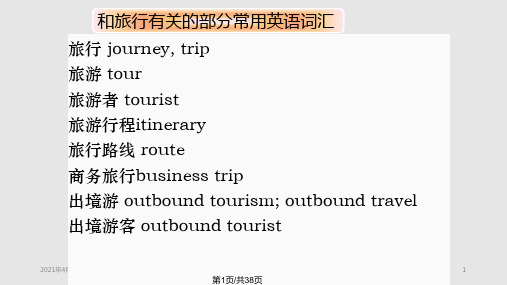
2021年4月8日
13
第13页/共38页
(Meeting the guests at the station
2021年4月8日
3
第3页/共38页
下行车 down train 行李车厢 luggage van, baggage car 车站大厅 station hall 收票员 ticket-collector, gateman 月台,站台 platform 站台票 platform ticket 小卖部 buffet 候车室 waiting room
2021年4月8日
2
第2页/共38页
旅游团 tour group 度假区 holiday resort 票 ticket 票价 fare 单程票 single ticket 往返票 round-trip ticket; return ticket 半票 half-price ticket 乘火车 Take the train
2021年4月8日
1
第1页/共38页
环程旅行 circular tour 往返旅行 return journey; round trip 包价旅游 package tour; 远足 excursion; outing 探险 expedition 旅行支票 traveller‘s cheque 旅游散客 independent traveler 行程 itinerary
2021年4月8日
4
第4页/共38页
护照 passport 签证 visa 证件 papers 起飞 take off 落地 touch down 登记牌 boarding pass 办理登机手续 check in
2021年4月8日
5
旅游英语
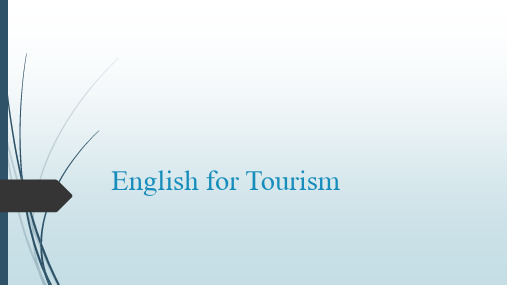
特级导游
石春满 1998年被评为全国特级导游员。山西省大同市中国国际旅行社日语导游员。现任 大同中国国际旅行社副总经理。著有《漫谈佛教及其寺院和塑像》等文章。
李志军 1998年被评为全国特级导游员。上海景致旅行社中文导游。擅长将中国文学知识 融于自然和人文景观讲解服务中,激发游客游兴,提高游客观赏水平。
Lecture 1 World Tourism Organization
Leading the World’s Largest Industry The World Tourism Organization believes that governments have a vital role to play in tourism. WTO exists to help nations throughout the world maximize the positive impacts of tourism, such as job creation, new infrastructure and foreign exchange earnings, while at the same time minimizing negative environmental or social impacts. Tourism is the world’s largest growth industry with no signs of slowing down in the 21st century. Receipts from international tourism have increased by an average of 9 p6 years to reach US$ 476 billion in 2000. During the same period, international arrivals rose by a yearly average of 4.6 percent to reach 698 million in 2000.
个人旅游 英语
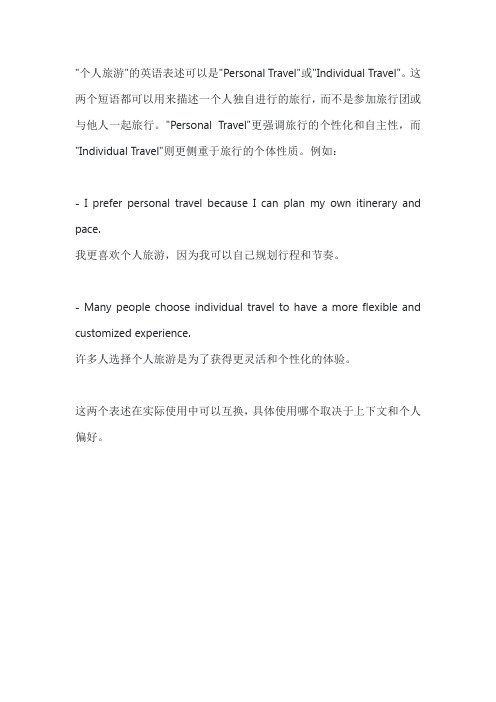
"个人旅游"的英语表述可以是"Personal Travel"或"Individual Travel"。
这两个短语都可以用来描述一个人独自进行的旅行,而不是参加旅行团或与他人一起旅行。
"Personal Travel"更强调旅行的个性化和自主性,而"Individual Travel"则更侧重于旅行的个体性质。
例如:
- I prefer personal travel because I can plan my own itinerary and pace.
我更喜欢个人旅游,因为我可以自己规划行程和节奏。
- Many people choose individual travel to have a more flexible and customized experience.
许多人选择个人旅游是为了获得更灵活和个性化的体验。
这两个表述在实际使用中可以互换,具体使用哪个取决于上下文和个人偏好。
旅游业英语词汇(较全)
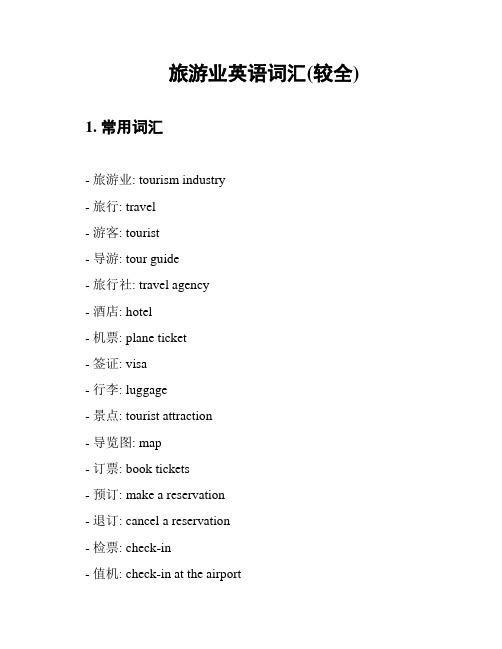
旅游业英语词汇(较全) 1. 常用词汇- 旅游业: tourism industry- 旅行: travel- 游客: tourist- 导游: tour guide- 旅行社: travel agency- 酒店: hotel- 机票: plane ticket- 签证: visa- 行李: luggage- 景点: tourist attraction- 导览图: map- 订票: book tickets- 预订: make a reservation- 退订: cancel a reservation- 检票: check-in- 值机: check-in at the airport- 登机: board a plane- 出发: departure- 到达: arrival- 航班延误: flight delay- 旅游套餐: travel package- 自助游: self-guided tour- 全包式旅游: all-inclusive tour - 当地文化: local culture- 汇率: exchange rate- 導覽: guided tour- 咨询台: information desk- 旅游纪念品: souvenirs2. 餐饮词汇- 餐厅: restaurant- 餐桌: dining table- 菜单: menu- 食物: food- 饮料: beverages- 点菜: order dishes- 开胃菜: appetizer- 主菜: main course- 饮食偏好: dietary preferences- 素食者: vegetarian- 饮食限制: dietary restrictions- 服务员: waiter/waitress- 结账: pay the bill- 小费: tip3. 交通词汇- 交通工具: means of transportation - 出租车: taxi- 公交车: bus- 地铁: subway- 火车: train- 船: boat- 自行车: bicycle- 摩托车: motorcycle- 行人: pedestrian- 交通拥堵: traffic congestion - 禁止通行: no entry- 禁止停车: no parking- 停车场: parking lot- 警察: police officer- 罚款: fine4. 地理方位- 北: north- 南: south- 东: east- 西: west- 上: up- 下: down- 前: front- 后: back- 左: left- 右: right5. 旅游方式- 租车: rent a car- 骑行: cycling- 徒步: hiking- 航空旅行: air travel- 邮轮旅行: cruise travel- 驴行: backpacking- 乘坐公共交通: using public transport以上词汇可以帮助你在旅游业的交流中更方便地和他人沟通。
旅游类的英语单词
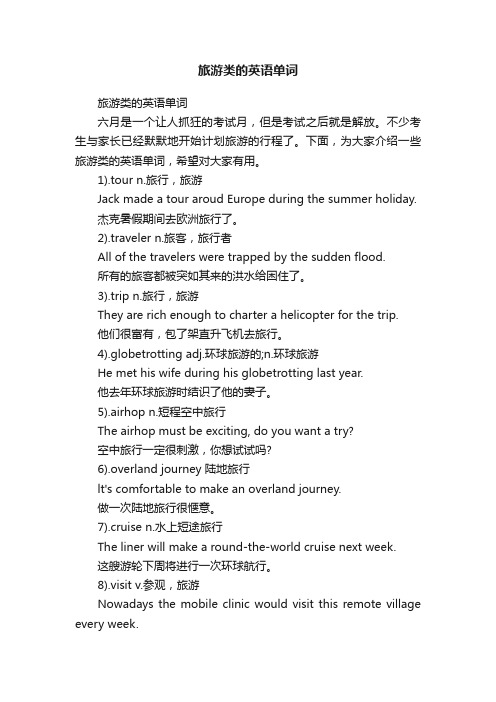
旅游类的英语单词旅游类的英语单词六月是一个让人抓狂的考试月,但是考试之后就是解放。
不少考生与家长已经默默地开始计划旅游的行程了。
下面,为大家介绍一些旅游类的英语单词,希望对大家有用。
1).tour n.旅行,旅游Jack made a tour aroud Europe during the summer holiday.杰克暑假期间去欧洲旅行了。
2).traveler n.旅客,旅行者All of the travelers were trapped by the sudden flood.所有的旅客都被突如其来的洪水给困住了。
3).trip n.旅行,旅游They are rich enough to charter a helicopter for the trip.他们很富有,包了架直升飞机去旅行。
4).globetrotting adj.环球旅游的;n.环球旅游He met his wife during his globetrotting last year.他去年环球旅游时结识了他的妻子。
5).airhop n.短程空中旅行The airhop must be exciting, do you want a try?空中旅行一定很刺激,你想试试吗?6).overland journey 陆地旅行lt's comfortable to make an overland journey.做一次陆地旅行很惬意。
7).cruise n.水上短途旅行The liner will make a round-the-world cruise next week.这艘游轮下周将进行一次环球航行。
8).visit v.参观,旅游Nowadays the mobile clinic would visit this remote village every week.现在巡回医疗队每周都会到这个偏僻的村庄来一次。
英文中旅游的表达
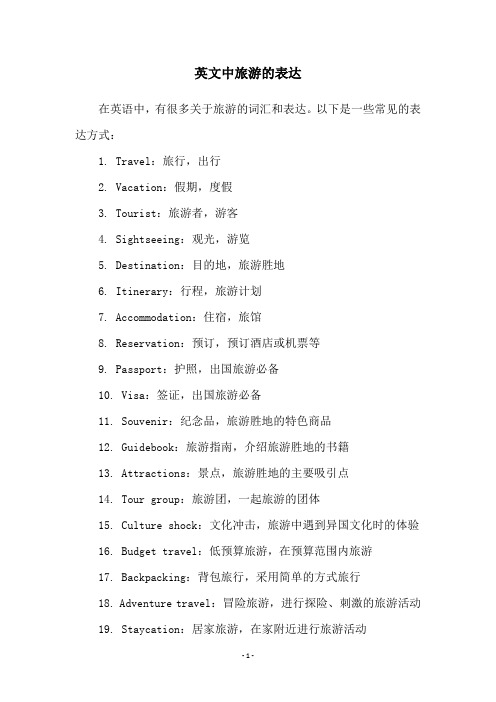
英文中旅游的表达
在英语中,有很多关于旅游的词汇和表达。
以下是一些常见的表达方式:
1. Travel:旅行,出行
2. Vacation:假期,度假
3. Tourist:旅游者,游客
4. Sightseeing:观光,游览
5. Destination:目的地,旅游胜地
6. Itinerary:行程,旅游计划
7. Accommodation:住宿,旅馆
8. Reservation:预订,预订酒店或机票等
9. Passport:护照,出国旅游必备
10. Visa:签证,出国旅游必备
11. Souvenir:纪念品,旅游胜地的特色商品
12. Guidebook:旅游指南,介绍旅游胜地的书籍
13. Attractions:景点,旅游胜地的主要吸引点
14. Tour group:旅游团,一起旅游的团体
15. Culture shock:文化冲击,旅游中遇到异国文化时的体验
16. Budget travel:低预算旅游,在预算范围内旅游
17. Backpacking:背包旅行,采用简单的方式旅行
18. Adventure travel:冒险旅游,进行探险、刺激的旅游活动
19. Staycation:居家旅游,在家附近进行旅游活动
20. Road trip:自驾旅行,使用自己的车辆旅行
以上是一些旅游相关的英语表达,希望对您的旅游英语有所帮助。
旅游用英语怎么说读
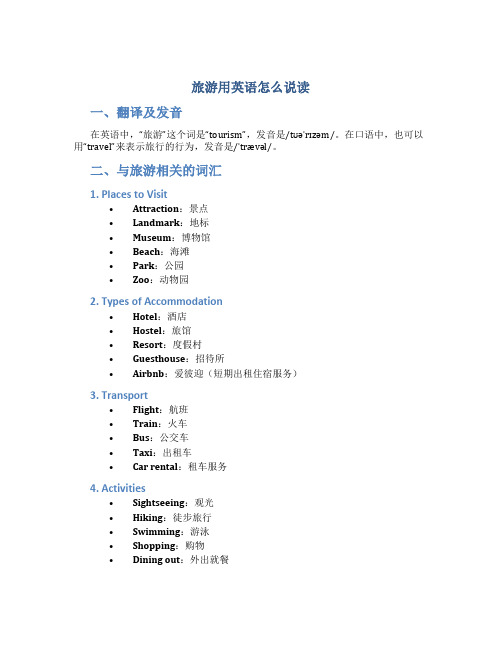
旅游用英语怎么说读一、翻译及发音在英语中,“旅游”这个词是“tourism”,发音是/tʊəˈrɪzəm/。
在口语中,也可以用“travel”来表示旅行的行为,发音是/ˈtrævəl/。
二、与旅游相关的词汇1. Places to Visit•Attraction:景点•Landmark:地标•Museum:博物馆•Beach:海滩•Park:公园•Zoo:动物园2. Types of Accommodation•Hotel:酒店•Hostel:旅馆•Resort:度假村•Guesthouse:招待所•Airbnb:爱彼迎(短期出租住宿服务)3. Transport•Flight:航班•Train:火车•Bus:公交车•Taxi:出租车•Car rental:租车服务4. Activities•Sightseeing:观光•Hiking:徒步旅行•Swimming:游泳•Shopping:购物•Dining out:外出就餐三、常用口语表达1.Can you recommend any good restaurants around here?(你能推荐这附近的好餐厅吗?)2.How can I get to the nearest bus station?(我怎样能到最近的公交车站?)3.Do you have a map of the city?(你们有这座城市的地图吗?)4.What time does the museum open?(博物馆什么时候开门?)5.I’d like to book a double room for two nights, please.(我想订一个双人房间,两晚,谢谢。
)四、常见旅游问题1. 通常如何支付酒店的预订费用?大多数情况下,您可以使用信用卡或借记卡在线支付预订费用。
一些酒店也接受现金支付或支付宝等第三方支付平台。
2. 在旅行途中如何保持安全?确保随身携带重要证件和贵重物品。
- 1、下载文档前请自行甄别文档内容的完整性,平台不提供额外的编辑、内容补充、找答案等附加服务。
- 2、"仅部分预览"的文档,不可在线预览部分如存在完整性等问题,可反馈申请退款(可完整预览的文档不适用该条件!)。
- 3、如文档侵犯您的权益,请联系客服反馈,我们会尽快为您处理(人工客服工作时间:9:00-18:30)。
机场指示篇机场费airport fee国际机场international airport国内机场domestic airport机场候机楼airport terminal国际候机楼international terminal国际航班出港international departure国内航班出站domestic departure卫星楼satellite入口in出口exit; out; way out进站(进港、到达) arrivals不需报关nothing to declare海关customs登机口gate; departure gate候机室departure lounge航班号FLT No (flight number)来自......arriving from预计时间scheduled time (SCHED)实际时间actual time已降落landed前往......departure to起飞时间departure time延误delayed登机boarding由此乘电梯前往登机stairs and lifts to departures迎宾处greeting arriving由此上楼up; upstairs由此下楼down; downstairs银行bank货币兑换处money exchange; currency exchange 订旅馆hotel reservation行李暂存箱luggage locker出站(出港、离开) departures登机手续办理check-in登机牌boarding pass (card)护照检查处passport control immigration行李领取处luggage claim; baggage claim国际航班旅客international passengers中转transfers中转旅客transfer passengers中转处transfer correspondence过境transit报关物品goods to declare贵宾室V. I. P. room购票处ticket office付款处cash (衣人注:我记得挂CASH牌子的地方是兑换钱币的地方,存疑)出租车taxi出租车乘车点Taxipick-up point大轿车乘车点coachpick-up point航空公司汽车服务处airline coach service租车处(旅客自己驾车) car hire公共汽车bus; coach service公用电话public phone; telephone厕所toilet; W. C; lavatories; rest room男厕men's; gent's; gentlemen's女厕women's; lady's餐厅restaurant酒吧bar咖啡馆coffee shop; cafe免税店duty-free shop邮局post office出售火车票rail ticket旅行安排tour arrangement行李牌luggage tag机票篇飞机票(指限定条件)endoresement/restrictions旅客姓名name of passenger旅行经停地点good for passage between起点城市from起飞日期date起飞时间time订座情况status机票确认ticket confirm登机口gate前往城市to承运人(公司) carrier航班号flight no.座舱等级class (fare basis)机号plane No.机座号seat No.吸烟坐位smoking seat非吸烟席non-smoking seat飞机票姓family name名First (Given) Name性别sex男male女female国籍nationality国籍country of citizenship护照号passport No.原住地country of Origin(Country where you live) 前往目的地国destination country登机城市city where you boarded签证签发地city where visa was issued签发日期date issue前往国家的住址address while in街道及门牌号number and street城市及国家city and state出生日期date of Birth(Birthdate)年year月month日day偕行人数accompanying number职业occupation专业技术人员professionals & technical行政管理人员legislators &administrators办事员clerk商业人员commerce (Business People)服务人员service农民farmer工人worker其他others无业jobless签名signature官方填写official use only签证篇姓surname名first (given) name性别sex出生日期birthdate国籍nationality护照号passport No.编号control No.签发地Issue At签发日期Issue Date (或On)失效日期(或必须在...日之前入境) expiry date ( 或before) 停留期为......for stays of10天ten days8周eight weeks3个月three months6个月six months1年one year3年three years签证种类visa type(class)乘机旅行汇词boarding check登机牌plane ticket飞机票flight, flying飞行bumpy flight不平稳的飞行smooth flight平稳的飞行ramp扶梯altitude, height 高度extra flight加班non-stop flight连续飞行circling盘旋forced landing迫降speed, velocity速度ceiling上升限度cruising speed巡航速度top speed最高速度first class头等舱night service夜航airsick晕机to taxi along滑行landing着陆to face the wind 迎风air route,air line航线climbing,to gain height爬升economy class,tourist class经济舱connecting flight衔接航班direct flight, straight flight直飞to rock, to toss, to bump颠簸to lose height, to fly low降低to take off, take-off起飞to board a plane,get into a plane上飞机to get off a plane,alight from a plane 下飞机一、问路时...East 东South 南West 西North 北Left 左Right 右Straight on 往前直去There 那儿Front 前方Back 后方Side 侧旁Before 之前After 之后First left/right 第一个转左/右的路二、请问如何前往 ...Excuse me, How do I get to the ....... ? 请问如何前往¨ ¨ ¨ ?How do I get to the airport? 请问如何前往机场?How do I get to the bus station? 请问如何前往公车站?How do I get to the metro station? 请问如何前往地下铁路站?(Metro 乃欧洲常用字)How do I get to the subway station? 请问如何前往地下铁路站?(Subway 乃北美洲常用字)How do I get to the underground station? 请问如何前往地下铁路站?(underground 乃英国常用字)How do I get to the train station? 请问如何前往火车站?How do I get to the hotel XXX? 请问如何前往XXX 酒店?How do I get to the police station? 请问如何前往警局?How do I get to the post office? 请问如何前往邮政局?How do I get to the tourist information office? 请问如何前往旅游资讯局?三、请问附近 ...Excuse me, Is there ....... near by? 请问附近有没有 ...?Is there a baker near by? 请问附近有没有面包店?Is there a bank near by? 请问附近有没有银行?Is there a bar near by? 请问附近有没有酒吧?Is there a bus stop near by? 请问附近有没有公车站?Is there a cafe near by? 请问附近有没有咖啡店?Is there a cake shop near by? 请问附近有没有西饼店?Is there a change bureau near by? 请问附近有没有找换店Is there a chemist's near by? 请问附近有没有药剂师?Is there a department store near by? 请问附近有没有百货公司Is there a disco near by? 请问附近有没有的士高?Is there a hospital nearby? 请问附近有没有医院?Is there a night club near by? 请问附近有没有夜总会?Is there a post box near by? 请问附近有没有邮政局?Is there a public toilet near by? 请问附近有没有公共厕所?Is there a restaurant near by? 请问附近有没有餐厅?Is there a telephone near by? 请问附近有没有电话?Is there a travel agent near by? 请问附近有没有旅游社?Is there a youth hostel near by? 请问附近有没有青年旅馆?旅游中在旅馆住宿我會晚一点到达,请保留所预订的房间。
